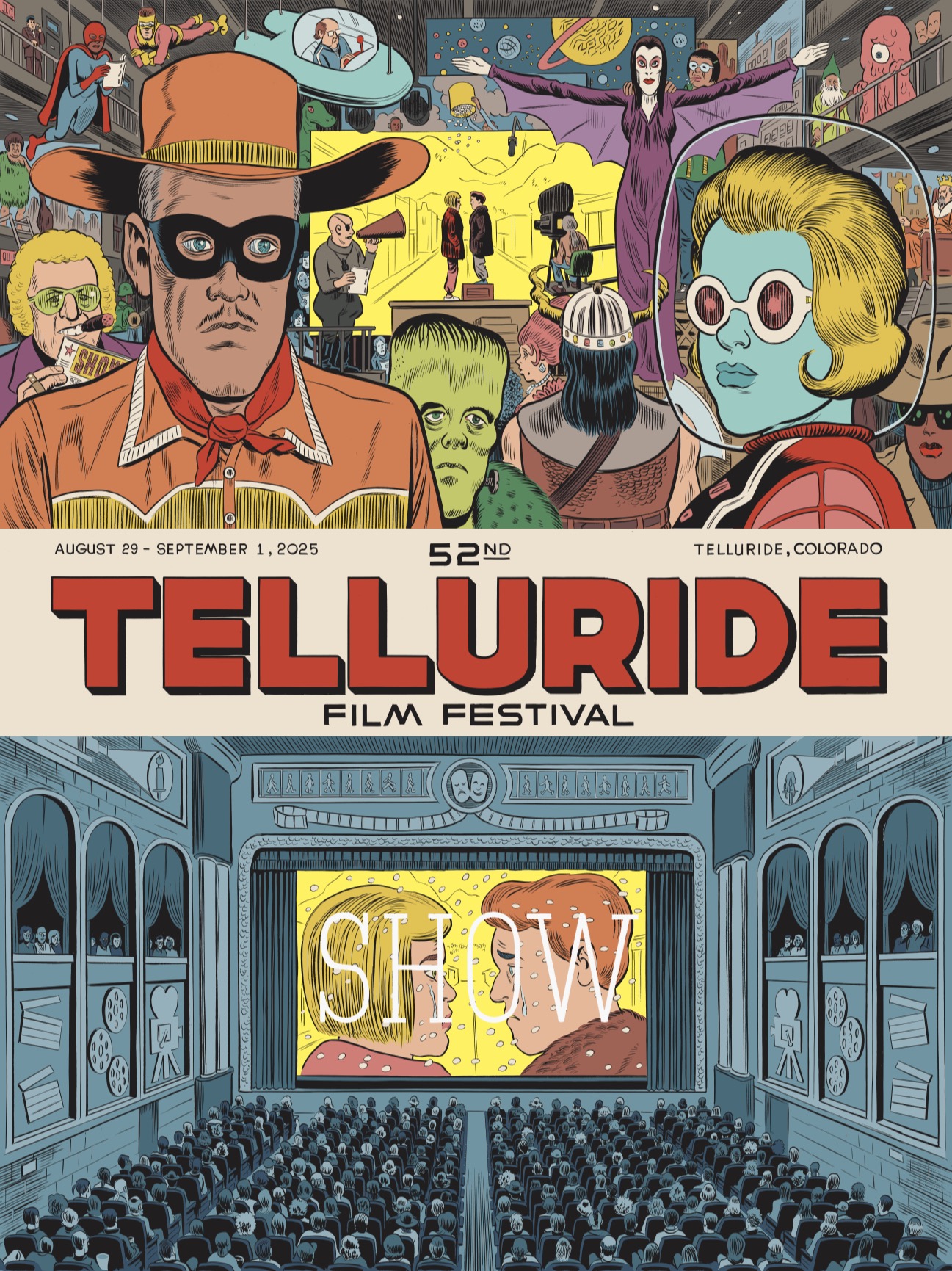
02 Sep TFF #52: Reliably Audacious, Time & Again Julie Burned Down the House!
Presented by the National Film Preserve, the Telluride Film Festival (TFF) just closed its 52nd year of celebrating the art, not the industry of film. The program always brings together cinema enthusiasts, filmmakers, and artists to discover the best in world cinema in the breathtakingly beautiful mountain town of Telluride, Colorado.
Go here for more about the Telluride Film Festival (back to 2009).
And scroll down to read Telluride Inside… and Out’s review of Labor Day weekend happenings 2025.
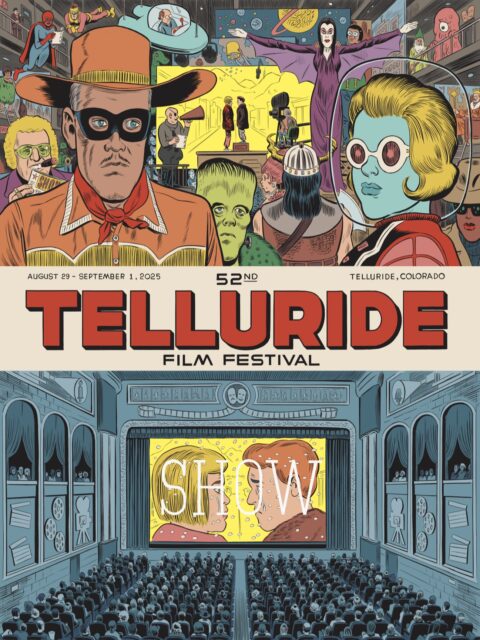
“There are three things that are better than advertised: Groundhog Day, the Calgary Stampede – and the Telluride Film Festival,” said actor Bill.Murray.
The peeps who make the popcorn know what they are doing.
Not so much The Industry. But here in Telluride rest assured there were no blockbusters. Just complicated characters and their struggles with money, sex, social compulsion and the intricacies of the human heart.
While life around the world remains on a high-fructose, corn syrupy IV line, the Telluride Film Festival continues to push back with its rule-breaking magic. And those ribbons of dreams (Orson Welles) tend to bleed through the screen into the hearts and minds of the audience.
Cue the Beatle’s: “All You Need is Love.”
Well, partially true – if the subject is PK Mahanandia.
All you need is love – a bike and the courage to follow a dream that was written in the stars.
Been on a dating site lately? One of the key questions is how far a person would be willing to find true love? Proximity, yes or no, appears to be a deal-maker – or breaker.
But not if you are PK.
“The Cycle of Love”:
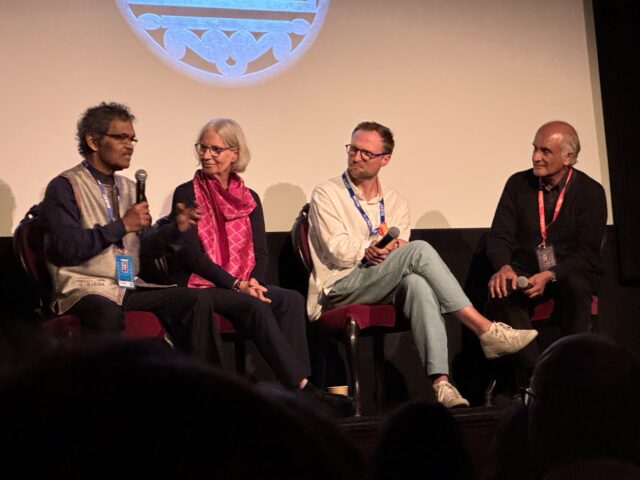
“The Cycle of Love,” Pk, Lotta, von Einsiedel, Pico Iyer. Image., John Fitzpatrick.
Directed by Oscar winner Orlando von Einsiedel (“The White Helmets,” “Virunga”), “The Cycle of Love,” is a universal, globe-trotting tale of enduring love (and a direct challenge to India’s caste system).
The riveting, uplifting doc follows the romantic journey of a Delhi street artist, an “Untouchable” and gifted artist. PK trekked 6,000 miles by bicycle in 1977, crossing continents to reunite with the love of his life, Lotta von Schedvin, in Sweden. The couple first met when she visited the metropolis of Delhi and he sketched her portrait.
PK’s mind-blowing odyssey is universally praised by critics for its ability to draw and hold the audience’s attention through his and Lotta’s voices, dramatic re-enactments and breathtaking landscape shots.
Hands down one of the most romantic, beautifully crafted docs to come down the pike in years and an antidote to today’s socio-political convulsions.
For we saps who favor Hollywood endings, TFF audiences were privileged to meet the charming couple who have now been together for 50 years and counting.
Resilience against all odd. Love not war amongst ourselves. Shamelessly optimistic.
Pretty please pass that plate.
Love is sometimes having to say you are sorry: “Sentimental Value.”
Famous films about dysfunctional families abound. The list includes comedies and dramas such as “The Royal Tenenbaums,” “Little Miss Sunshine,” “American Beauty,” and “Parenthood,” as well as darker films such as “The Godfather,” “The Virgin Suicides,” and “Hereditary,” all of which explore themes of conflict, poor interpersonal communication, and emotional abuse.
Add to that list, “Sentimental Value.”
Danish-Norwegian auteur director Joachim Trier directed this impeccably architected film, a multi-layered, inter-generational drama, that explores themes of love, loss, art, memory and unresolved grief.
A TFF favorite “Sentimental Value,” traces the lives of the Borg sisters: Nora, a stage actress with a monkey on her back – the weight of inherited ambition; Agnes, the sibling with feet firmly planted on the ground – but her role as mother and caretaker masks unfulfilled needs. Gustav (Stellan Skarsgård) is their estranged father, who reenters their lives after a very long absence. The Borg family house in Oslo is the fourth character, the place serving as a multigenerational anchor across decades. And its walls have ears.
Equal parts heart-breaking and heart-warming, “Sentimental Value” is a tale is a dark comedy and an motional roller coaster ride that breaks then makes us all whole again. Also a clear tip of the hat to Trier’s countryman Igmar Bergman.
“…There’s a sense in this film that Trier has elevated his craft as a director. His work now reflects not only technical mastery but also a deeper philosophical engagement with his characters and their inner lives. Much like Bergman in films like Scenes from a Marriage, Trier employs a narrator who verbalises the inner states of his characters with startling clarity. Emotions aren’t simply identified. They’re evoked through vivid metaphors that draw us deeper into the character’s interior world…
‘…’Sentimental Value’ is filled with emotional honesty. It’s a reminder of why we turn to cinema in the first place. It’s to make sense of the world. Great films help us understand why we feel the way we do. They offer a kind of clarity that life often withholds. In doing so, films like this one help us come to terms with the people we love. Not as we wish they were, but as they truly are, flawed and deeply complex. ‘Sentimental Value’ will almost certainly find itself in the awards conversation by year’s end. I loved everything about it,,” raved Scene Now.
Career-defining role for Stellan Skarsgård, a sure bet for Best Actor. Also Best Directing and Best Foreign Film.
“Hamnet” is one more variation on the theme of love and having to say you are sorry.
But it was a WOW of an apology by one William Shakespeare
Chloé Zhao’s “Hamnet” serves as an imagined origin story for Shakespeare’s great tragedy “Hamlet,” boldly suggesting the latter was inspired by the real-life tragedy of the former. The film explores how the grief and loss experienced by The Bard and his wife Agnes after the death of their son channeled into the creation of one of Shakespeare’s most famous plays. Hamnet, died at age 11 around the same time he began writing his tragedy, creating a historical link that is the film’s foundation
“Hamnet” is after all the story of the parents haunted by their son’s death, so the film provides the emotional backstory for the historical figure, offering a moving, fictionalized account of how Shakespeare’s art was a profound and personal act of transformation.
What’s more, the tender film deliberately centers on the perspective of Agnes, a figure often relegated to a footnote in history, reaffirming Hamlet through her personal heartbreak and how she processed loss and giving a voice to the grief of the family rather than simply focusing on the play’s male creator.
“Hamnet” emphasizes how profound human experience, particularly sorrow from loss, can be transformed into lasting art. By giving a face to the tragic family history behind the play, the movie underlines the trope that great art is often born from personal pain and loss.
The Hollywood Reporter heaps big praise on Jessie Buckley as Agnes and Paul Mescal as Shakespeare describing them as “wonders.”
“In Hamnet, the latest film from Oscar-winning ‘Nomadland’ director Chloé Zhao, the two always go hand in hand: joy and fear, love and loss. One feeds into the other in a cycle as old as life itself, and unavoidable. But just as her William Shakespeare (Paul Mescal) turns the pain of being caught between the two into the masterpiece that is ‘Hamlet’, Zhao harnesses those elements into something gorgeous and cathartic…”
Maggie O’Farrell co-wrote this adaptation of her acclaimed novel.
“The first time we see Agnes (Jessie Buckley), she’s curled up asleep at the mossy base of a giant tree. Dressed in red and purple, she looks like a flower, or perhaps an organ — a heart out in the open, ready to be plucked up and held close. Next to her lies a void, a hollow beneath the roots so deep and so dark that it looks like nothing at all,” continued The Hollywood Reporter.
Or very much like one of Andy Goldsworthy’s site-specific sculptures – which ironically are all about the ephemeral nature of life. Which means all things pass. Nothing stays the same.
In the end, “Hamnet” is as emotionally raw with Agnes herself, a stand-in for a mother, yes, but also for Mother Nature herself, a powerful, shamanic creature.
“…It’s (Hamnet) a powerful argument all around about how the human experiences can transform into art and storytelling , and it is front and center in these films, with ‘Hamnet’ perhaps being the most vivid example of them all…,”
To be or not to be Best Picture and other nods remains an open question.
What is certain is that “Hamnet” is a gut punch that leaves us shaken and stirred.
Dark, glittering portraits off machismo and its discontents in “Ballad of a Small Player”:
In Plato’s “Republic,” while walking near the execution grounds in Athens, Leontius sees a pile of dead bodies. Though he is disgusted and turns away, he is also seized by a morbid desire to look. This inner conflict rages for awhile as he struggles with himself, covering his eyes. Eventually, Leontius’ desire overpowers his shame and revulsion. Herushes toward the corpses, pushing his eyes wide open, and says, “Look for yourselves, you evil wretches, take your fill of the fair sight”.
In “Ballad of a Small Player” we the audience are Leontius and the island of Macau is Athens. The movie is dark portrait of self-delusion and machismo and its discontents. It is also a fever dream that pointedly garish, but impossible not to look at.
Or listen to.
The score thunders.
Then there the performance by Colin Farrell, who wears his anti-hero character like a second skin.
Farrell is “Lord Freddy Doyle,” a down-on-his-luck gambler trying to play ostrich in Macau by day – but who heads out like a vampire every night trying to whittle down his mountain of debt.
Doyle (or Riley) is offered a lifeline by the sultry, mysterious casino employee with her own dark secrets. However, in hot pursuit is a private investigator ready to confront Doyle with what he is running from. But as he tries to outrun his sorry fate, the walls of reality inevitably close in.
Directed by Edward Berger, (“Conclave”), “Ballad of a Small Player” opens with a single word that instantly captures the movie’s through-line: “Fuck.” The profanity is not gratuitous; it is a refrain that echoes throughout this story of a man who knows his goose is cooked even before the eats his breakfast: scrambled life trumps scrambled eggs.
“…At the core of it all stands Farrell, delivering one of the best performances of his career. His trembling hands and desperate eyes give Doyle a fragile sense of humanity underneath all the self-inflicted devastation. Farrell has long excelled at playing broken men, but with this showcase role here he pushes further, embodying a figure at once pathetic and magnetic, making him impossible to look away from. In his bright crimson suit, he looks like a man trying to be noticed even as he’s already fading…, wrote Next Best Picture.
Another Best Actor nod. Doyle may be an emotional zero. But Farrell is a 10.
“I want to make art that hits you in the head like a baseball bat,” Farrell told a rapt audience at Telluride’s Palm Theatre, adding “ We were all together in the foxhole.”
Continuing in the vein of machismo and complicated characters, next up is “Springsteen: Deliver Me From Nowhere.”
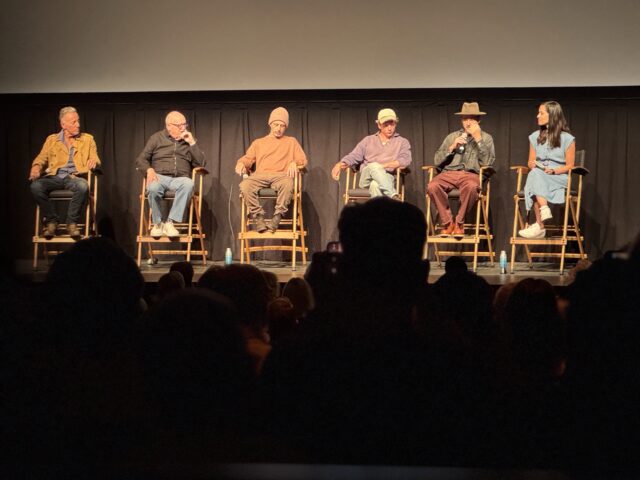
From Q & A preceding “:Springsteen: Deliver Me from Nowhere.” Credit John Fitzpatrick.
Adapted from Warren Zanes’s 2023 Springsteen biography, “Deliver from Me from Nowhere” and directed by Scott Cooper, the movie is different from other Springsteen-centric ventures. Rather than a typical cradle-to-grave biopic, “Nowhere” does a deep dive into a specific, dark chapter of the superstar’s life. Those early days of personal struggles and the creative process behind a unique album, offering an intimate character study rather than a greatest-hits package.
The film, for example, shows Springsteen watching Terrence Malick’s “Badlands” and listening to abrasive sounds like the punk duo “Suicide,” which influenced the dark, desolate themes of the new songs on “Nebraska,” a lo-fi album that would become one of the Boss’s most enduring works.
“…The decision to portray the man not as a Rock God, but as a fragile human being who’s also an uncompromising artist gives ‘Deliver Me From Nowhere’ a solemn integrity. Some will argue that key songs from Nebraska are missing (my longtime favorite, the hypnotic “’State Trooper,’ is heard only in passing). And anyone eager for a detailed track-by-track study of the album should turn to Warren Zanes’ book, which served as the basis for Cooper’s screenplay.
“…What the film and White’s agonized, internalized performance amply convey is the state of mind from which one of the most important albums in the Springsteen canon — the one he considers his best — materialized. Movies about depression are tough, but fans invested in the subject during a transitional moment of artistic and personal catharsis will be rewarded,” raved The Hollywood Reporter.
“…If some fans go in expecting the equivalent of a greatest hits package, think again. Springsteen: Deliver Me From Nowhere is the real deal, an intelligent, deliberately paced journey into the soul of an artist. There was high praise for White too: “He is utterly convincing on every count, but this is no mere SNL-style imitation. White gets to the essence of the man without copying him, but the transformation is nothing less than stunning…, said Deadline.
As a young Springsteen, The Bear’s” Jeremy Allen White is “such a terrific actor,” Springsteen has said, “you just fall right into it.”
The Boss goes on to say: “He’s got an interpretation of me that I think the fans will deeply recognize. He’s just done a great job. I’ve had a lot of fun being on the set when I can get there.”
Of the star,Variety’s Peter Debruge added: “He slips easily into the worn denim and sleeveless T-shirts that were Springs teen’s signature. More importantly, he does all his own singing, capturing the scratchy, soul-searching baritone that marked that period of his career.”
“..White… gives a committed and authentic performance as The Boss: He doesn’t look a ton like Springsteen (though popped collars and black leather jackets help sell the illusion), and his ability to sing just like him is sorely underused in a movie that defaults to the actual recordings whenever it can, but his performance is steeped in a truth so natural and unforced that by the end of the film you almost forget that he’s playing someone else…,” added Indiewire.
“Playing Springsteen was an out of body experience,” White told a packed house at The Palm.
Unlike many conventional read cradle-to-grave) music biopics, “Deliver Me From Nowhere” offers an intimate, quietly deliberate journey into Springsteen’s soul during a critical moment of artistic and personal transformation and redemption.
Director Scott Cooper’s (“Crazy Heart”) minimalist approach results in maximal impact. Oscar nods are inevitable.
Two other noteworthy docs: “La Grazie” and “This Is Not a Drill”:
“La Grazie” was inspired by a true story. Director Paolo Sorrentino based the premise of the film on the case of a man pardoned by Italian President Sergio Mattarella after being convicted of murdering his wife, who had Alzheimer’s disease. The case was the starting point for exploring the profound moral and ethical questions associated with a president’s power to grant pardons.
Timely subject, no?
One translation of the title of the film’s title is, in fact ,“The Pardon.” “La Grazie” delves into the psyche of President Mariano De Santis as he prepares to leave office. The inner thoughts of the dignified leader, who has earned the nickname “Reinforced Concrete” for his composure, are unraveled as he confronts his own legacy, mortality, and personal regrets.
De Santis is played by Sorrentino’s longtime collaborator Toni Servillo as a fictional president paralyzed by indecision near the end of his term over two pardons and a bill that allows euthanasia – while missing his dead wife and continuing to obsess about her infidelity.
But “La Grazie” can also mean “grace” – for the personal sense of grace the president seeks. Ultimately he quiets the noise in his head through quiet contemplation.
“The first thing to be said about Paolo Sorrentino’s captivating portrait of an esteemed political leader in the waning days of his term is that Toni Servillo really is some kind of marvel. The great theater actor who transitioned into film with instant command has been a talismanic presence in the director’s work since his 2001 debut. Sorrentino hands him a jewel of a role in Mariano De Santis, a fictional president of the Italian Republic who describes himself as “a gray, boring man, a man of the law,” instead revealed to be a wellspring of deep feeling, humanity and — to his own surprise — doubt…,” raved The Hollywood Reporter.
Others have also praised “La Grazie” for its contemplative depth and visual craftsmanship – and an exceptional performance by Servillo, who masterfully conveys the president’s inner turmoil with great economy. A stoic exterior hides deeply repressed feelings. Memorable visuals include a solitary astronaut’s floating tear, which underlies notions such as what we can and cannot know about life – but expressed if Sorrentino’s surreal fashion. Then there is also an exotic law enforcement dog.
“…As always with the director, the level of craftsmanship is dazzling. ‘La Grazia’ is a visually luxuriant film with a highly seductive sheen, but it’s the movie’s warmth and emotion, its spirit of forgiveness, understanding and hard-won wisdom that creeps up on you. Or to borrow from the title, its grace, a word used in Italian also for official pardons. Servillo communicates the ways in which Mariano — a fantasy figure in our broken world — acquires grace via the most economical means. It stands among the estimable actor’s greatest performances…,” concluded The Hollywood Reporter.’
‘This Is Not A Drill” highlights the urgent threat of environmental injustice and climate change through the personal, “David and Goliath” stories about grassroots activists, demonstrating that ordinary individuals can create significant change by challenging some of the world’s most powerful corporate interests.
Which makes the doc a refrain of environmental activist, entrepreneur and philanthropist Paul Hawken’s prophetic “Blessed Unrest” (2007), the premise of which is that change comes from the ground up, not top down.
“This is the first full amount of the real news of our time, and it’s exactly the opposite of the official account.. The movers and shakers on out planet aren’t the billionaires and the generals – they are the incredible numbers of people around the world filled with love for neighbor and for the earth who are resisting, remaking, restoring, renewing, revitalizing. This powerful and lovely book is their story – our story – and it’s high time someone told it. Nothing you read for years to come will fill you with more hope and more determination,” wrote climate activist and author Bill Mckibben, whose latest book on the subject is “Here Comes the Sun.”
Nothing except the group of activists and heroes behind ‘“This Is Not A Drill”:
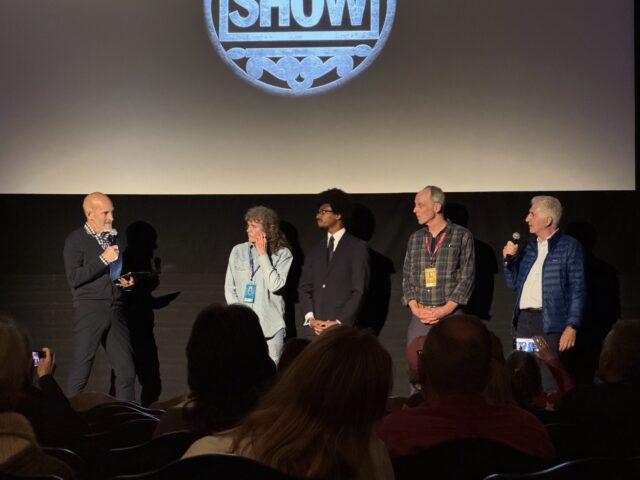
Director and activists from”This Is Not A Drill.” Image John Fitzpatrick.
Justin J. Pearson (who later gained national recognition as one of the “Tennessee Three”) as a young activist in Memphis. He forms a diverse coalition to successfully fight a proposed oil pipeline that would have run through economically disadvantaged, predominantly Black neighborhoods. His story is a powerful example of how grassroots organizing can achieve major victories against powerful companies.
In Louisiana, Roishetta Ozane, a mother of six, takes on the oil refineries and corporate polluters in her backyard. Her activism is spurred by the devastation of unprecedented hurricanes, and she works to educate her community about the links between environmental pollution and extreme weather.
A former oil industry employee in Texas, Sharon Wilson uses her inside knowledge to expose the industry’s practices. With an infrared camera, a blog, and a YouTube channel, Wilson documents methane emissions and reveals the industry’s misleading narratives and enduring threats for her activism.
Just as “Blessed Unrest” underlines, “This Is Not a Drill” is an inspiring and gritty depiction of ordinary citizens fighting against powerful entities to protect the environment and their communities. The doc shows grassroots activism, courage, and determination in the face of corporate and political opposition. It highlights themes of corporate power, misinformation, environmental justice, and the effectiveness of collective action, providing a timely narrative about the fragility of progress and the need for continued vigilance to protect and preserve grace, justice and beauty in our world.
Among the activists and supporters of the cause are members of the Rockefeller family, fighting the company their great-grandad built. (John D. Rockefeller was America’s first billionaire.)
To help, support The Equation Campaign.
The Tributes: Panahi, Baumbach and Hawke or “It Was Just An Accident,” “Jay Kelly” and “Blue Moon”:
Their legacy of resilience and global influence is widely acknowledged and celebrated.
We are taking about Iranian filmmakers like Jafar Panahi – who has been jailed at least twice – their success a testament to the resilience of filmmakers who produce works of remarkable creativity and humanism in the face of severe political repression. The enduring artistic tradition and poetic temperament of Iranian culture contribute to the rich, allegorical style that allows filmmakers to speak truth even without explicit freedom.
Panahi made “It Was Just an Accident” following his release from his 2022 internment. The film was in fact inspired by his time in prison. And the movie won top prize at Cannes this year.
As the story goes, an unfortunate encounter with a dog sets off a chain of surreal, grotesque events that expose the corruption and tyranny at the heart of Iran,” wrote The Guardian.
‘Accident” is an emotionally explicit up close- and- personal view of state violence and revenge.
“,,,the pain of tyranny that co-exists with ostensible everyday normality. There are macabre stabs of satire, black comedy and horror-farce, and the movie almost looks like an Iranian dissident tribute to ‘Weekend at Bernie’s’ or even Hitchcock’s ‘The Trouble With Harry…,” continued The Guardian.
Moral ambiguity is at the center of many of the films featured at TFF. Examples include “A Private Life” and the aforementioned “Sentimental Value,” and “Hamnet” to name a few.
The question Panahi leaves on the table is, however, as simple as E=mc2:: Is this band of former prisoners no better than their torturers?
What’s for certain is that the past simply can’t and won’t stay buried.
Critics consensus is this: Perhaps the most bluntly political film by Jafar Panahi yet, “It Was Just an Accident” is a defiant rebuke of authoritarianism that somehow manages to deliver the entertainment value of a gripping thriller – albeit one with Keystone Cops undertones.
Noah Baumbach’s “Jay Kelly”:
Noah Baumbach is considered a literary filmmaker thanks to his philosophical, witty, and often intellectual scripts.His films tend to be deeply personal, even semi-autobiographical. Themes include love, loss and the challenges of growing up.
“Jay Kelly” tells the tale of a famous movie star and his devoted, if beleaguered manager as they head out on what turns out to be a seminal journey through Europe.
George Clooney plays the titular character; his manager is Adam Sandler. The story delves into themes of fame, the sacrifices made for a career, and the nature of celebrity – themes echoed in ‘Sentimental Value” (with more grace and subtlety.).
“A major star for the majority of his adult life, Jay Kelly has so thoroughly subsumed himself into his classic screen persona — smirking, debonair, heroic — that he no longer seems to know who he is off set. More troublingly, the world-famous actor has come to like it that way. As Sylvia Plath once wrote: ‘It’s a hell of a responsibility to be yourself. It’s much easier to be somebody else or nobody at all…’
“…Getting close to other people was something that Jay always planned to do later, and the prospect of receiving a tribute from a Tuscan film festival is an unavoidable sign that he’s running out of time. But other people were always going to be incidental to what really matters about ‘Jay Kelly,’ a gorgeously bittersweet shortfaller that hits hardest as a cautionary tale about the perils of trying to avoid oneself in a world that only allows us to act like there’s anyone else for us to be. Being a movie star just makes it that much easier to pass on the roles you were born to play, “ concludes IndieWire.
We are not among those who think “Jay Kelly” will sweep the Oscars. An iconic star (and purportedly a nice guy with a conscience), offers up his familiar smile, showing too many teeth, too many times. “Jay Kelly” is chockablock with well worn cliches.
Ethan Hawke in “Blue Moon”:
To embody the five-foot-tall Lorenz Hart, the 5 ’11” Hawke shaved his head and adopted a “comb-over” hairstyle. He also underwent a physical transformation to appear shorter. His theatrical, intimate portrayal made this great actor unrecognizable. And his nuanced performance perfectly captures Hart’s wit, vulnerability, struggles with alcoholism and depression and sexual ambiguity. Critics have praised his turn as theatrical, yet intimate, showcasing an actor “at the height of his craft.”
We agree. Directed by Richard Linnklater, “Blue Moon” is a tour de force of acting and undeniably mesmerizing.
Written with wry humor and perspicacity by Robert Kaplow, whose novel was the basis of Linklater’s 2008 feature, ‘Me and Orson Welles,’ the new film is set in the world of Broadway and expands on theater lore in illuminating personal ways.
“‘Blue Moon’ is a deceptively modest project, but it’s beautifully executed and fascinatingly nuanced despite being quite straightforward in terms of plot. The movie has a lot to say about the give and take of creative collaboration; the fickle embrace of the then-quite-insular New York theatrical community; the somewhat safe space of that environment for gay men, even if it was seldom spoken of openly; and the fact that even that degree of tacit acceptance does little to alleviate the solitude of the closet.
“And in ways to which most of us can probably relate even if we might be reluctant to admit it, the movie is an honest reflection on the conflicted feelings with which we might sometimes greet the success of friends in our fields. It’s another satisfying and characteristically idiosyncratic entry in the fruitful Hawke and Linklater collaboration,” raved The Hollywood Reporter.
The brilliant film uses the setting of a single night at Sardi’s restaurant to represent a lifetime of longing and the bittersweet cost of artistic genius. It is a poignant character study of Lorenz Hart, using a specific historical moment to illustrate the universal experience of aging, loss, and the search for connection in an ever- changing world.
Exclamation point.


Sorry, the comment form is closed at this time.